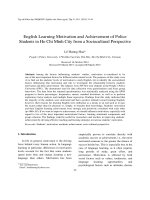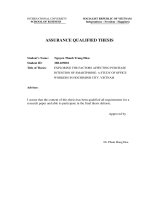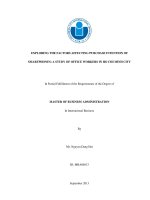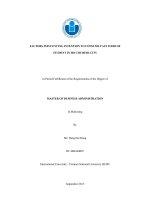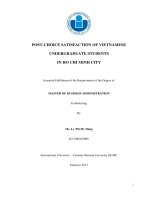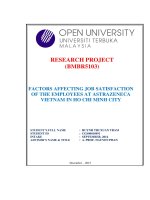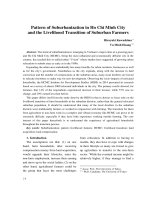Factors affecting the effectibeness of learning eng lish of students in ho chi minh city
Bạn đang xem bản rút gọn của tài liệu. Xem và tải ngay bản đầy đủ của tài liệu tại đây (624.5 KB, 70 trang )
UNIVERSITY OF ECONOMICS HO CHI MINH CITY
International School of Business
------------------------------
LE DUC PHUOC
FACTORS AFFECTING THE
EFFECTIVENESS OF LEARNING
ENGLISH OF STUDENTS IN HO CHI
MINH CITY
MASTER OF BUSINESS (Honours)
Ho Chi Minh City – Year 2014
UNIVERSITY OF ECONOMICS HO CHI MINH CITY
International School of Business
------------------------------
LE DUC PHUOC
FACTORS AFFECTING THE
EFFECTIVENESS OF LEARNING
ENGLISH OF STUDENTS IN HO CHI
MINH CITY
ID: 21110015
MASTER OF BUSINESS (Honours)
SUPERVISOR: Dr. Lam Nguyen Huu
Ho Chi Minh City – Year 2014
List of abbreviation words
EC: English center
EL: English
HCMC: Ho Chi Minh City
L1: native language, first language
L2: second language
SNS: social networking sites
LLS: learning language strategies
EFA: exploratory factor analysis
Page 1
List of figures and tables
Table 1: The research process .................................................................................... 31
Table 2: features of samples: About sex..................................................................... 33
Table 3: Features of samples: About Age .................................................................. 34
Table 4: Features of samples: Years of learning English ........................................... 35
Table 5: Features of samples: Scores in TOEIC ........................................................ 35
Table 6: Features of samples: Best confident skill in English ................................... 36
Table 7: The reliability analysis: Cronbach’s Alpha ................................................. 37
Table 8: KMO and Bartlett’s test .............................................................................. 39
Table 9: ANOVA........................................................................................................ 43
Table 10: Coefficients ................................................................................................ 44
Figure 1: The research model .................................................................................... 28
Figure 2: Process of data analysis .............................................................................. 33
Figure 3: The Scree plot ............................................................................................ 40
Figure 4. Conclusion model of impact factors ........................................................... 45
Page 2
TABLE OF CONTENTS
Abstract ...............................................................................................................................
Chapter 1- INTRODUCTION
1.1 Research background................................................................................................. 6
1.2 Management problem ............................................................................................... 8
1.3 Research problem ...................................................................................................... 9
1.4 Research objectives / questions ................................................................................. 9
1.5 Scope / delimitations ................................................................................................. 12
Chapter 2- LITTERATURE REVIEW
2.1 Definition of foreign language .................................................................................. 13
2.1.1 What is foreign language?...................................................................................... 13
2.1.2 Motivation of second language learners ................................................................ 13
2.2 About English ........................................................................................................... 17
2.2.1 English and characteristics of English ................................................................... 17
2.2.2 The importance of English towards learners ......................................................... 19
2.3 Difficulties of learner when study foreign language ................................................. 21
2.4 Factors impact to learner when study English........................................................... 22
2.4.1 Learner’s self motivation ........................................................................................ 22
Page 3
2.4.2 Hi technology support ............................................................................................ 23
2.4.3 English teacher and teaching method ................................................................... 23
2.4.4 Online social network ............................................................................................ 25
2.5 The research model and hypothesis ........................................................................... 27
2.5.1 Research model....................................................................................................... 27
2.5.2 Hypothesis .............................................................................................................. 27
Chapter 3-RESEARCH METHODOLOGY
3.1 Research process........................................................................................................ 30
3.2 Research design ......................................................................................................... 30
3.2.1 Organization of analysis......................................................................................... 30
3.2.2 Sample and sampling .............................................................................................. 30
3.2.3 Measurement scale ................................................................................................. 31
3.3 Data collection and analysis ..................................................................................... 31
3.4 Summary .................................................................................................................... 31
Chapter 4-DATA ANALYSIS
4.1 Some features of sample ............................................................................................ 33
4.2 Data analysis .............................................................................................................. 35
4.2.1 Reliability Analysis ................................................................................................. 36
4.2.2 Exploratory Factor Analysis .................................................................................. 37
Page 4
4.2.3 Regression Analysis ................................................................................................ 42
4.3
Interpret meaning of the regression model………………………………………43
Chapter 5- CONCLUSION, IMPLICATIONS AND LIMITATIONS
5.1 Conclusion ................................................................................................................. 45
5.2 Implication ................................................................................................................. 46
5.3 Limitation and future research ................................................................................... 47
References ........................................................................................................................48
Appendix ..........................................................................................................................51
Questionnaire ...................................................................................................................61
Page 5
Abstract
The benefits of learning a foreign language in general and English in particular perhaps
nobody are not known. With the fluently skill of using English can help you: access to
knowledge of the world, communication with people, promote at work. However, it is a
true that many people whether have no change learning in school or any class, even if
not living in a foreign country, but they have the ability to learn and use the language
fluently and quickly, however there are many cases that so many people spend time and
fee of learning long-term, but over time they can not be used or no upgrade. So what is
the reason for this phenomenon.
There are many reasons affecting to foreign language learning. First, learners have no
guider, don’t know where to start, what’s important, which one should be study first,
which one second and use which methodology. So the role of the guider is help learners
system all knowledge. Second, learners are too focusing on grammar. When the grammar
just takes 7% in communication, 93% rest is motion and body language. Third, learners
study for the testing/examination but not for use. Most of student when they studied
second language is being pressure of the examination, they try to study the trick to pass
the exam and forget that studying is for using. Fourth, Most of learners are not patient
enough. They want how to speak foreign language influent in short time.
This paper will figure out the factors affecting the performance of students learning
English (not foreign language specialists) are enrolled at HCMC and thus can introduce
effective methods for learning students.
Keywords: effectiveness of learning English, learning English of student in HCM city,
methodology to fluent English
Page 6
Chapter 1
INTRODUCTION
1.1 Research background
Research background is the role of English in current society. It would be interesting if
we could have access to the latest information, while others could not. We can talk and
communicate with friends who can, and can go far on the job while others look at you in
admire eyes. You can totally do this if you are good at English.
But one article from Tuoitre e-newspaper said that “the English qualified of graduated
students are lower than the average standard even learner spent a lot of money and time”
(Thanh Ha, 2014).
So far, more than 30 years ago, an important shift has taken place in the field of
second/foreign language learning, and researchers have focused mainly on learner’s
individual factors. There is a proverb states that give a man a fish and he eats for a day.
Teach him how to fish and he eats for a lifetime. Applying such proverb in language
learning and teaching, tells us that if students are taught strategies of language learning to
work out, they will be empowered to manage their own learning. In such way, native
language speakers use the same strategy types as learners of second/foreign language use.
In addition, differences between more effective learners and less effective learners were
found in the number and range of strategies used. so, it is undeniable of the importance of
encouraging using learning language strategies. Moreover even there are some researches
support the belief that learners who receive learner training, generally learn better than
who do not. In addition, there is relationship between the frequent use of learning
strategies and achievement in the language. Therefore, there is claim that use of language
learning strategists helps the learners retrieve and store material, and facilitate their
learning.
Page 7
The studies regarding learning English effective as a second language are done in three
different areas which are: the characteristics of learning English strategies (Oxford, 1990;
O‟Malley & Chamot,1990; Wenden & Rubin,1987); the variables affecting learning
English effective (Nyikos & Oxford, 1993; Wharton,2000); and the effect of strategy
Training on second/foreign language learning (Oxford, 1990).
From the variables affecting from point of view above, individual differences have been
identified as variables influencing language learning outcome; In addition, the high
percent of source of learners gain the knowledge is teacher; encourage teachers to
discover the prescriptive belief of their own students. And in order to provide successful
instruction, teachers need to learn to identify and understand their students‟ individual
difference, and even they need become more aware that their teaching styles are
appropriate to their learner's strategies.
1.2 Management problem
According to a survey by the Ministry of Education and Training Vietnam and ETS
(English testing services). The survey was evaluated 9.948 freshman sample from 13
colleges for the average score was 250 on the TOEIC. On the other hand, after few years
in college, 51.7% of graduates do not meet the requirements of English language skills.
Only 10.5% of the university has made survey assessed the ability to meet the job
requirements of English skills of graduates. The results showed that about 49.3% students
meet the requirements of the recruiters, 18.9% students did not meet, and 31.8% students
need more training. Survey results are statistically Department of Higher Education
reports on the status of the 59 teaching English language college (which not major as
English school) in the country ( ).
There is a real scenario in HCM city that a lot of students come from some rural areas,
country side or provinces where have no native teacher can help them got a best method
to study English. When they go to a big city to study, they understood how English is
important to them, so they was spent money and time to study, hoping can get a better job
in future, but it seems quite hard and waste resources if they don’t have a logic method.
Page 8
In the other hand, some method maybe effect in other countries but not work with learner
is Vietnamese, so this report also want to find out is there any different between the
native learner and non native learner.
Whenever we understand in sight or the nature of learners we can adjust not only the
teaching method but also the studying method in current education system to meet desires
from learners and fulfill requirements from recruiters.
This thesis is willingness to look for guide and orient learner approach the best method of
studying English.
1.3 Research problem
The research problem of this paper is the effectiveness of learning English of student in
HCM city. So we have to insight understand student with many dimensions of reason to
study English.
To understand the issue of research problem, a number of question was posed to students
as, have student volunteered to study? , is it force by their parents, require of jobs?
Because of better life or it’s simple just because of satisfy their hobbies? If the
motivations start from their inside, it’s mean that they want to learn, so, high result is
something not over their ability and possible. But if different, they studied just likes “a
thing must pass if you want to graduate from school”, of course, it is another story.
1.4 Research objectives/ questions
What are the key characteristics of learner lead to high result?
People were born with diversity of characteristics, and every job in social need special
person. Example, a salesman must be good as talking and persuading, a teacher must
having a good voice, so to study EL well, learners also need some special quality.
If learners afraid of making mistakes, of losing face with friends when speaking or
writing English surely that it comes to learner’s performance.
Example, according to Self-Efficacy Theory mention above, self-efficacy is a kind of
personal expectation or judgment concerning one's capability to accomplish some task.
Page 9
It’s also defines self-efficacy as an individual's judgments of his or her capabilities to
perform given actions. The more people believe in themselves to achieve their goals, the
stronger and higher their motivation is.
This report also wants to answer the other four questions below:
Does teacher and teaching method play a role factor impacts to result of learning EL?
Methods of teaching English not only in universities but also in high school has been a
controversial issue in many forums online and offline in VN. There has been survey of
teaching effectiveness is due to the quality of teachers, however, from English teachers
are also countered quite reasonable. Some said that by psychology of student just wanted
to achieve the achievement or scores; others said that due to the design of training
program (issued by the Ministry of Education and Training) is not really justified.
How the hi-tech equipments support bring back the effective to learners in study process?
It's undeniable that hi-tech facilities are more and more effect to young generation who
are leaner in English as a second language nowadays.
If previously student are limited due to lacking of material and mostly using hard copy
document on learning purpose, nowadays with technology, modern equipment such as
laptops, smart phone and other devices can easily access the internet, it also means they
own diversified and more abundant reference material sources, such as all kinds of
dictionary, online forums to share materials and experiences, sound tract and video in
English, tests samples ...
This thesis also wants to find out whether with the support of high-tech equipments can
bring better results for learners of English
Does the online social network participant get relationship with learning EL effective?
Analysis from socialbakers.com – the most popular website in the world analytics about
social network such as: Facebook, Google+, Linkedin, Twitter…- in 2013, there are
about 20-milion active accounts only in Vietnam. In which, 45% users are between 18-24
years-old, the College of University age of student.
Page 10
The average time per user spend on internet is 2 hours and 23 minutes. With that amount
of time, users have more change to interact with English, so perhaps some more will
impact to learning EL effective of student, data retrieving from www.socialbakers.com
(Statistics on social networks Vietnam).
Does job’s requirement impact to result of learning EL?
Especially after VN WTO, more and more multinational companies entry VN to do
business. Thus, the need for using high quality human resources is increasing day by day.
one of the requirements is almost mandatory in requests from employers is the ability to
communicate in English. Just spend few minutes at some popular recruitment websites in
Vietnam such as: www.careerlink.vn, www.myjob.vn, www.mywork.vn ... it is not hard
to realize that English is almost the necessary skill in the recruitment file.
English is one of important sites for young people entering the life and it is nearly
indispensable if students wish to work for foreign companies, joint ventures or in the big
public Vietnam companies, which often have a business relationship cooperation with
international partners.
Different from others knowledge and skills that may be the company to accept training
after recruitment, English is often tested and used immediately in the recruitment process,
therefore ready to use English all the time, everywhere is very important point to be able
to get a good job.
Page 11
1.5 Scope / delimitations
This report is planned to conduct in HCM city, year 2014. According to report from
Ministry of Education and Training (Vietnam), in 2014 there are about 240.000 students
in multilevel of education system from college to university in HCM city (report about
budget and amount of student).
Conclusion chapter 1:
The contents of this chapter generalized some basics of the report such as, research
objective, research scope, research management…continue in chapter 2, will introduce
literature related to report and some hypothesis before conduct the survey.
Page 12
Chapter 2
LITERATURE REVIEW
2.1 Definition of foreign language
2.1.1 What is foreign language?
A foreign language is a language indigenous to another country. It is also a language not
spoken in the native country of the person referred to, i.e. an English speaker living in
Japan can say that Japanese is a foreign language to him or her. These two
characterizations do not exhaust the possible definitions, however, and the label is
occasionally applied in ways that are variously misleading or factually inaccurate.
A language other than the mother tongue that a person or community uses for public
communication, in trade, higher education, and administration.
Non-native language officially recognized and adopted in a multilingual country as a
means of public communication.
2.1.2 Motivations of second language learners
Among factors determining second language learning achievements such as attitude,
learner preferences, learner beliefs, and age of acquisition, motivation gains widespread
acknowledgement as the most influential. Thus, being able to conceptualize motivation as
exactly as possible will, without a shred of doubt, be beneficial to all who related, like
educationalists, psychologists, teachers and learners, to name a few.
Though motivation has secured its dominant and preeminent position in second language
learning research, paradoxically, no consensus is actually reached on a satisfactorily
precise definition of motivation. The long term controversy put down to the
complicatedness, multi-faceted, or multi-factored nature of motivation as a conclusion
drawn by Dörnyei (1998, p.117), “Although, motivation‟ is a term frequently used in
both educational and research contexts, it is rather surprising how little agreement there
is in the literature with regard to the exact meaning of the concept”. Later on, Dörnyei
(2001b, p. 7), ironically named it “as no more than an obsolete umbrella that hosts a wide
Page 13
range of concepts that do not have much in common”. The complexity of
motivation can be unified since them all intended to explain nothing less than the reasons
for human behavior (Dörnyei, Csizér, and Németh, 2006).
Moreover, from observations of Dörnyei (2001b, p. 8), most scholars agree, at least, that
motivation provides a source of energy that is responsible for “the choice of a particular
action,” “the persistence with it,” and “the effort expended on it”.
One popular definition proposed by Gardner (2011, p.10) in his eminent socioeducational model of language acquisition, regarded motivation as “the combination of
effort plus desire to achieve the goal of learning the language plus favorable attitudes
toward learning the language.” In this definition, three mentioned factors of effort, desire
and attitude apparently belongs to the interior dimension of learners themselves. Thus, it
is detectable that Gardner neglected social aspects of motivation such as learners
stimulations linked to parents, teachers and peers, for instance.
Subsequently, a more thorough definition of second language motivation is suggested,
where in motivation is a state of cognitive or emotional arousal’ which provokes a
decision to act which results in sustained intellectual and/or physical effort’ so that the
person can achieve some previously set goal’(Williams and Burden, 2001, p.120). The
two researchers consider the roles of both individual and contextual factors in motivation
and the temporal aspect of motivation.
In recent period of process-oriented perspective, Dörnyei and Ottό (1998, p. 65)
presented a rather well-rounded definition in recognition of many other authors‟ previous
achievements gained through years of hard work on the field.
They concluded that motivation is a dynamically changing cumulative arousal in a person
that initiates, directs, coordinates, amplifies, terminates, and evaluates the cognitive and
motor processes whereby initial wishes and desires are selected, priority, operationalised,
and (successfully or unsuccessfully) acted out. This umbrella term covers well the
temporal, dynamic nature of motivation as well as points out its directive role in the
cognitive process.
Page 14
An extensive body of literature exists on classifying motivation into types based on
varieties of criteria. Integrative motivation is perceived as “a sincere and personal interest
in the people and culture represented by the other language group” (Lambert, 1974).
Instrumental motivation refers to “the practical value and advantages of learning a new
language” such as, get good marks, pass an examination, or find better jobs/promotions
etc. Resultative motivation suggests that their success in learning trigger more
motivation, while failure does the opposite (Crookes and Schmidt, 1991). Extrinsic
motivation, considered by most scholars to be the same as instrumental motivation,
derives from a number of outside factors such as winning a prize or avoiding punishment
(Deci and Ryan, 2010).
Alternatively, intrinsic motivation, partly resemble integrative motivation, originates
from learners‟ internal needs for competence and self-determination, satisfaction, and
enjoyment (ibid, p. 32). According to the findings of most studies, intrinsic motivation to
the second language learning is responsible for learners‟ achievement more significantly
than extrinsic one.
However, in peculiar situations, the extrinsic may surpass or even internalized to be
intrinsic. For instance, it holds true where the role of second language is as means of wide
communication; thus, weight of each types of motivation relies on particular sociocultural conditions. In a nutshell, these types of motivation are “complimentary rather
than as distinct and oppositional” (Ellis, 1998) as a learner, in reality, often possesses a
joint motivation of all abovementioned.
Demotivation:
Viewed as the negative counterpart of motivation, nonetheless, demotivation seriously
fails to catch due scholarly concentration and thus receives scant empirical researches up
to 1990s.
Dörnyei described demotives as "specific external forces that reduce or diminish the
motivational basis of a behavioral intention or an ongoing action" (2001b, p.90).
However, it appears to conflict with his later reference to "external and internal
Page 15
demotivating factors" (Dörnyei, 2007, pp.29-30). In the same vein, Sakai and Kikuchi
(2009) indicate, researchers regard both internal factors and external factors as
demotivators. In addition, the borderline between internal factors and external factors is
indistinguishable at some points. Henceforth, the term “demotive” or “demotivator”
appears in the present study is “forces which subtract from the overall motivational basis
of intended or ongoing action.” (Pigott, 2008 adapted from Dörnyei, 2001b, p.43) and
demotivation to mean “the state of a learner whose level of motivation is lacking enough
to severely restrict progress” (Pigott, 2008).
Looking at its role in second language learning, though the picture remains rather blurred,
Christophel and Gorham (1995) figure out that “the strongest influence on motivation
was not the presence of moti vators in the classroom, but the absence of demotivators.” In
the same vein, Rost (2004) warned, “one demotivating act can negate or wipe out the
positive effects of ten motivating acts”.
Dörnyei (2001b, p.142) describes a demotivated learner as “someone who was once
motivated but has lost his/her commitment/interest for some reason”. Demotivated
learners show a lack of interest in the second language or second language community
culture, hesitate to participate in any class activities, have no intimate affiliation with
teacher and/or peers. Consequently, they harbour ever-growing diffidence in classroom
environment. Eventually, these learners end up with appalling learning outcomes, which
in turn aggravate remaining motivation. Once such a wicked circle materializes, it turns
almost unbreakable.
Amotivation
Amotivation, or learned helplessness, a concept emerged in self-determination theory.
Amotivation is defined as the situation in which people lack the motivation to take any
action seeing that 'there is no point...' or 'it's beyond me...' (Deci and Ryan, 2010). This
happens when they lack self-efficacy or a sense of control on the desired outcome. Thus,
the amotivated learner sets no goal and hold neither intrinsic nor extrinsic motivation to
make any move.
Page 16
2.2 About English
2.2.1 English and characteristics of English
English is the International Language and is one of the most popular and most spoken in
the technology world. We need to know English language in order to study any science
subject or any computer language. We need to know English to communicate effectively
too many developed countries. English is very much important in our life...it is necessary
in each and every field. If we know English we never feel tongue tide in front of others.
It's a widely spoken language. People take pride in speaking English. If we don't know
English, we will leave behind the others. English is a need of hour. Today we can't deny
the importance of English in our life. To anyone who lives in an English speaking
country, it is of vital importance. Language is always very important, because it is the
means of communication. If you cannot speak the language of a place, it will be very
difficult to communicate with the people. And so it is an absolute necessity. We
communicate with others every day. Weather we just say 'hello' or have a long
conversation, or weather we give or follow instructions, or weather at home or at the shop
or in the workplace. Communication is a tool for everyday life-Everyone uses it every
day. And language makes it a whole lot easier, so everyone learns to speak their native
language. And English is the most widely spoken language in the world, and if you know
how to speak it, it will be an invaluable tool of communication. You can develop your
knowledge for betterment of your knowledge. As long as you educate yourself, you will
come across many new things. There is no end for learning.
A / vocabulary:
1- Many words in English can usually be used in academic English, but its meaning
is not entirely the same as speech. For example, the word "underline" in the
sentence "The research underlines the Importance of International Trade
Agreements" means to provide (give emphasis to something) is not underlined as
in "Underline your family name." This concern led to the debate when he said the
word means A, B others say that when they really mean that it must depend on the
Page 17
context. It is also classified by candidates who have extensive background and
strong English language will be used, "a solid Evidence" contestants also usually
end up taking "solid" when referring to the solid state of the object that only. So to
understand this is not much else to read academic articles, as it will gradually
understand the differences in meaning of simple words in academic writing than
normal, and can be confident use it in my article.
2- Academic office contains a large amount of formal, high academic nature is less
common in speech. This is also the reason why I opened the competition to
reinforce learning for the whole family to this segment at least people can
recognize it in the reading, listening, proceed to use it in the article. How to use
the word, expression is extremely important because judges rely on this but
decided to do all of the contestants is high or low.
3- Last feature is extremely important and different from Vietnamese academic
English that use large amounts of noun phrases (noun phrases), each noun phrase
to contain a lot of important information. Skilled people who know how to write
academic writing is more of a noun phrase and link them together coherent
throughout. I have learned a great experience from discussing the use of Google
while writing through which each person can edit their own posts very effective as
follows. Whenever you write one noun phrases but certainly not native speakers
use it or not, go to Google type that phrase into the search box, put in the memory
or dual (i.e "an Emerging disease"). After you press enter and get the search
results, then look to the left column with 'everything, news, and more (much
more). You will find out more click on a series from other sources such as Books,
Films ... Now that you select Books or News then wait for the results. If found in
catalog Books that the data demonstrate that native speakers can use --> I used to
be. Conversely, if they do not see how the phrase is not okay, need to reconsider.
This is how I discovered the absurdity of "a lot of diseases starting up" as a result
do not have the resources to write this in the knowledge of mankind. But with all
Page 18
the attention this way should be used only by the phrase because if made with
whole sentences and paragraphs, it is very easy to suspect "plagiarism"
(plagiarism). This VN’s students not stumble much, but if you are prepared to
study and submit one essay for all foreign teachers that were found, it would be a
very bad impression on us that.
B / About Grammar
Academic English requires the use of varied sentence patterns, alternating single
sentence, complex sentence, compound sentence (there are many propositions).
High point when candidates use more complex sentence patterns while
maintaining stable grammar and accuracy. We should review the grammar books
to reinforce the knowledge of the common phrases, and can look at the discussion
of the article also has a lot of quality with sample sentences and that people have
to learn that.
2.2.2 The importance of English towards learners
In global world today, the importance of English can not be denied and ignored when
English was being the most common language spoken all over the world. With the help
of technology, English has been playing a major role in many sectors including medicine,
engineering, and education.
The first reason for why English should be the medium of instruction at universities is
that it helps students find a high quality jobs.
In business life, the most important common language is obviously English. In addition
to this, especially, high-quality jobs need good understanding ability and speaking in
English. Therefore, companies can easily open out to other countries, and these
companies generally employ graduates whose English is fluent and orderly. For example,
the student who is graduated from a university which takes English as a major language
will find a better or high-quality job than other students who don’t know English
adequately. In other words, the student who knows English is able to be more efficient in
his job because he can use the information from foreign sources and web sites. He can
Page 19
prepare his assignments and tasks with the help of these information. Therefore,
undoubtedly, his managers would like his effort or prepared projects. In addition, many
high-quality jobs are related with international communication and world-wide data
sharing. University graduates who are in a international company and business are
needed to communicate with foreign workers. For instance, if their managers want them
to share the company’s data, they are expected to know English. Moreover, they will
even have to go business trip for their company. Absolutely, all of these depend on
speaking English; as a result, new graduates have to know English in order to get a highquality job, and the others, who don’t know English, may have lack of communication
and be paid less money.
The second and the most important reason, for English to be the medium of instruction
higher education system is that it enables students to communicate with the international
world.
In these days, in my opinion, the most important thing for both university students and
graduates is to follow the development in technology. For this reason, they have to learn
common language. Certainly, they should not lose their interest on communicating with
the world. However, some of the university students can’t obtain English education in
their university. Unfortunately, these people may lose their communication with
worldwide subjects and topics. In short, they will not communicate foreign people. To
prevent these people from lacking of speaking English, universities’ administration will
provide English education to them. In addition, university students can use some specific
hardware and software of computers with their English to communicate others. For
example, the Internet, which, in my own opinion, is the largest source in the world, based
on English knowledge and information. Also, most of the soft ware such as “Windows”,
“Microsoft Office”, “Internet Explorer” are firstly written in English, and these programs
are the basic vital things for communication over computer. That is to say, even in a little
research about something, they need these programs and the Internet to find necessary
sources and information
Page 20
So, English is role an important factor for learners in many ways.
− First, students who know English are easier to find their favorite job related with
their field.
− Second, they can communicate with “rest of the world”.
− Third, English makes accessing information easy for students.
2.3 Difficulties of learners when study foreign language
Language teaching practice often assumes that most of the difficulties that learners face
in the study of English are a consequence of the degree to which their native language
differs from English. A native speaker of Vietnamese, for example, may face many more
difficulties than a native speaker of German, because German is closely related to
English, whereas Vietnamese is not. This may be true for anyone of any mother tongue
setting out to learn any other language. See also second language acquisition for mixed
evidence from linguistic research.
Language learners often produce errors of syntax and pronunciation thought to result
from the influence of their L1, such as mapping its grammatical patterns inappropriately
onto the second language, pronouncing certain sounds incorrectly or with difficulty, and
confusing items of vocabulary known as false friends. This is known as L1 transfer or
"language interference". However, these transfer effects are typically stronger for
beginners' language production, and second language acquisition research has highlighted
many errors which cannot be attributed to the L1, as they are attested in learners of many
language backgrounds.
It is important to remember that learning a second language involves much more than
learning the words and the sounds of a language. Communication breakdowns occur not
only due to the more commonly understood syntax and pronunciation difficulties but
because when we learn a language we also learn a culture. What is perceived as right,
normal and correct in one language and culture does not always "translate" into a second
language...even when the vocabulary is understood. Communication breakdowns may
occur as a result of cultural assumptions regarding age, forms of address, authority and
Page 21
respect, touching, eye contact and other body language, greetings, invitations, and
punctuality to name just a few.
In particular, some learners may have very different cultural perceptions in the classroom
as far as learning a second language is concerned. Also, cultural differences in
communication styles and preferences are significant.
2.4 Factors impact to learner when study English
2.4.1 Learner’s self motivation
- Lack of a large enough force, a very specific purpose. People often hesitate to start a
course, or when school is not trying, and in many cases enrolled for some time, then quit
halfway through.
- The second is the difficulty most people have no rational methodology, there is no
method known in Vietnam as the standard for all to follow.
- Habit translated into Vietnamese to understand the letter, eager to hear and remember
information as well as 100% some college students do not distinguish between the core
content is necessary to grasp, what is the Secondary information can be ignored in the
process of listening. Distorted perception of the requirements of this type of course as
learners and fatigue tend to hesitate, confusion in class listening in class.
- From limited capital is the biggest obstacle for the comprehension of the learners. This
restriction makes the school so stopped thinking when meeting new words, had to miss
most of the next information. That's not to mention the psychological stress factors can
hear the familiar word processing became popular not recognize new words during the
hearing. Pronunciation Vocabulary also increases the difficulty of the subjects to listen to
many times. The negative change in rapid and continuous speech compared to articulate
each syllable of the teacher in the class as well as significant obstacles. Such phenomena
schwa sound / ə /, swallowing negative phenomena (elision), negative assimilation
(assimilation), and that sound simple (homophone), is always the challenge for nonlanguage learners. That's not to mention the different accent (accents) capital shock and
psychological crisis for the school.
Page 22
2.4.2 High technology support
High technology already has an important role of learning English effective to both
individuals and schools.
But in the other hand, we are understood of its potentials has encouraged a shift in
emphasis from computer technology itself to its applications. So, looking ways to use
high technology for convincing teaching and learning has gained prominence in the
research. Nowadays, the use of multimedia, the Internet, and diversity forms of distance
learning are wide spread. Interest in using them as tools to support language learning is
growing, both from the perspective of a language educator and that of a language learner.
A significant amount of literature explored the potentials of computer technology with
regards to teaching and learning languages more effectively. Dunkel (1990), for example,
asserted that the possibilities of computer technology as a tool could include increasing
language learners’ self esteem, vocational preparedness, language proficiency and overall
academic skills. Furthermore, the benefits of multimedia, the Internet, and various forms
of distance education were explored by many others. Educators were particularly
interested in technology’s interactive capabilities, such as providing immediate feedback
and increasing learner autonomy, in addition to the capability of simulating real-world
situations via audio.
Moreover, discussions of the benefits of computer technology included the exploration of
the application of certain technologies in specific language areas. Hypermedia technology
with its linking and interactive capabilities was discussed as a tool to enhance vocabulary
learning, and reading comprehension. Video and audio considered as the potentials to
support text comprehension.
2.4.3 Teachers and teaching method
There were many researchers and articles have attempted to describe and explain
how is the best model of second language teacher and language learning methods.
Although they have showed different classifications and conceptualizations of both
concepts above, for example, O’Malley & Chamot (1990) conclusion language
Page 23

